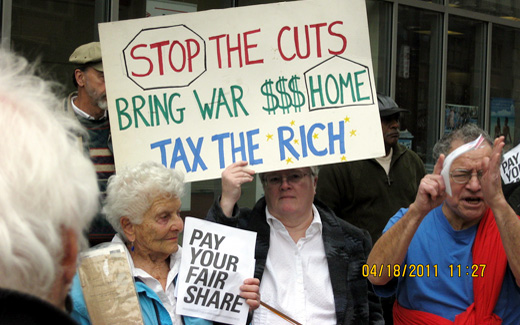
WASHINGTON (PAI) – The U.S. left, including unions, needs one unifying theme to both rally their own forces and to gain public backing, a panel of scholars says.
And the four scholars, two from the U.S. and two from abroad, say income inequality could be that theme. But they quickly noted the left must figure out how to get its message across to the masses, and what solutions to offer for the problem.
The lack of a message from the left, especially one that appeals to the mass of the U.S., is a persistent problem the labor movement faces. Several unions, notably the Teachers, have tried to address it. AFT has repeatedly declared that unions’ theme should be that “worker rights are human rights.” But other unions have not followed.
The four – Steven Kramer of the National Defense University, Georgetown University historian Michael Kazin, former senior Australian Labor Party political advisor Christopher Barrett and Italian attorney and veteran diplomat Roberto Toscano – spoke April 25 at the Woodrow Wilson International Studies Center in Washington.
And there was no shortage of their comments about the problems the left, as a movement, faces both here and abroad.
The four described leftist parties and movements in Western Europe and unions in the U.S., as outflanked in messaging by their rightist and corporatist foes, and as being effective only when great crises – such as the Depression and World War II – hit.
And in recent years, they added, the U.S. left has concentrated on gaining individual political rights rather than economic rights and equality of opportunity.
They also noted the right has consistently found one unifying theme, such as “anti-communism” or “anti-terrorism,” with which to scare people. And the right succeeded in demonizing its opponents along the way, particularly by tagging all progressives as “Socialists” and linking them to abuses in the former Soviet Union.
“When the Soviet Union collapsed, it was the end of one ideology. But the other is thriving,” Toscano commented.
The left, the scholars said, has developed no similar unifying theme to appeal to the mass of people. And its defenses and institutions – unions in the U.S. and Social Democratic parties in Europe – have been weakened, divided, or both, they said.
And the left underestimated what Toscano called “the protean qualities of capitalism” to adapt and feed people’s immediate desires. Despite the right’s denunciations of popular culture, capitalism’s attitude is “Do you want sex, drugs and rock and roll? Well, I can provide them.” That co-opts potential opposition, he said.
“Capitalism can thrive without democracy,” he ruefully added, citing China.
Even globalization plays a role in the problems of the left, Toscano pointed out, since “it has made the nation-state much less relevant” and the left has relied on the nation-state to enact progressive programs. That includes U.S. unions.
The scholars warned that workers’ rights may be too specific to unify the left and rally the rest of the U.S. Kazin noted the labor movement succeeded in big causes that united much of the U.S., such as civil rights, Social Security, Medicare and Medicaid. But its own cause – labor law reform – was perceived as just its own interest, and lost.
So they suggested the left, including unions, could adopt the yawning gap between the rich and the rest of us as the theme – explaining why it occurred and offering plans to close it.
“The left needs a vision. Once it was” opposition to “slavery, and the solution was freedom,” Kazin said. “Once it was corporate capitalism, and the solution was industrial democracy. Today, many people point to the income gap, but it’ll take a big leap” to find a solution, he admitted.
But the scholars also warned the left in general, and unions in particular, have communication problems, especially with white working class men. And the left missed an opportunity, with the Great Recession, to pin the problems of workers on those who caused them, particularly the bankers, traders and financiers, Kramer said.
That let the right step in and blame “regulations,” repeating the errors of the 1920s, he added. The reaction of the country to anti-recession legislation was that the bankers got bailed out and everyone else did not, leading to the 2010 sweep, he noted. And now there’s another global problem the left must deal with: The unanticipated – at least in the West – rise of industrialization in developing nations, especially China.
“That’s led to calls for ‘competitiveness,’ used as a battering ram to smash the gains and benefits of the middle class,” Kramer said.
With the right resurgent in the U.S. after the money-fueled GOP election sweep in 2010, the left finds itself, Kazin said, in an odd position: “We’ll have to act as conservatives,” in the true sense of the word, “conserving what was gained before, such as Medicare, Social Security and collective bargaining.”
Photo: Tax day rally at Bank of America Rally, April 18, in Philadelphia. Ben Sears/PW












Comments